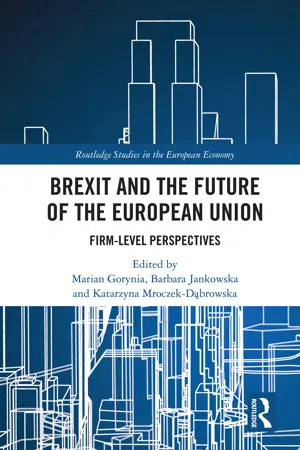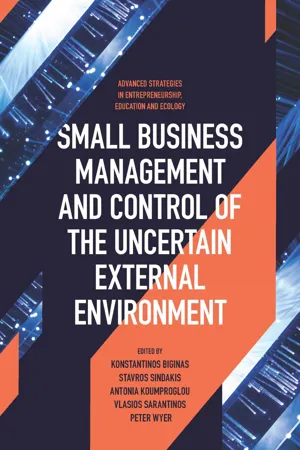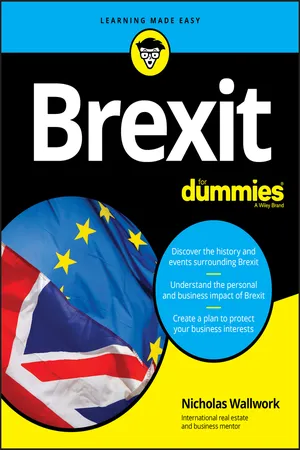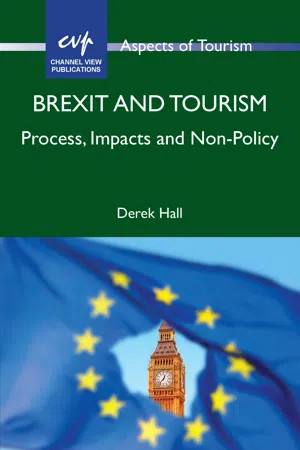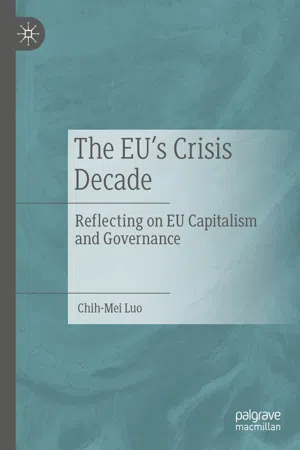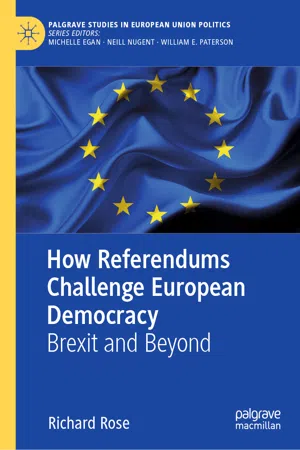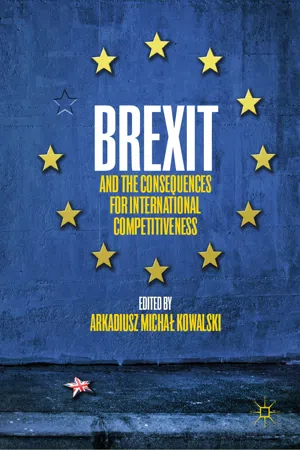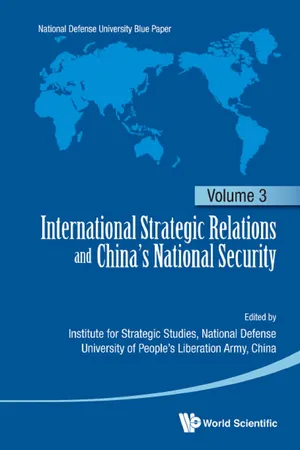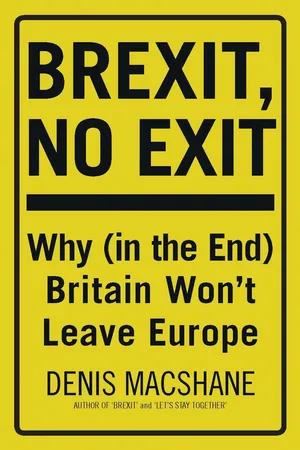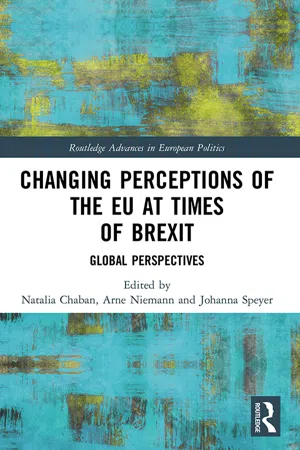Economics
Impact of Brexit on UK Economy
Brexit has had a significant impact on the UK economy, leading to uncertainty and volatility in financial markets, as well as affecting trade relationships with the EU. The depreciation of the pound, potential barriers to trade, and changes in investment patterns have all contributed to economic challenges for the UK. The long-term effects of Brexit on the UK economy remain uncertain.
Written by Perlego with AI-assistance
Related key terms
Related key terms
1 of 4
Related key terms
1 of 3
10 Key excerpts on "Impact of Brexit on UK Economy"
- eBook - ePub
Brexit and the Future of the European Union
Firm-Level Perspectives
- Marian Gorynia, Barbara Jankowska, Katarzyna Mroczek-Dąbrowska, Marian Gorynia, Barbara Jankowksa, Katarzyna Mroczek-Dąbrowska(Authors)
- 2021(Publication Date)
- Routledge(Publisher)
The projected effects of Brexit on the EU and the UK1Marian Gorynia, Aleksandra Kania, Ewa Mińska-StruzikIntroduction
The origins of Brexit presented in Chapter 2 lead to a broader reflection, which boils down to the following questions:- What were the tendencies in international economic relations in the second half of the twentieth century and in the twenty-first century?
- Do these tendencies continue and are likely to continue, or do we face a period of re-evaluations and peculiar twists and turns?
- What are the fundamental challenges for humanity due to globalization regardless of Brexit and what impact can Brexit have on them?
- In what sense do contemporary processes form the Brexit’s basis and context? What does Brexit change in these tendencies?
The UK’s decision to leave the EU was a landmark moment for European integration. The British electorate voted to leave the EU by a 51.9% majority. The result of the referendum on Brexit organized on June 23, 2016, surprised many observers and started a series of attempts to anticipate what the consequences would be for both the British and European economies. Several institutions published model-based forecasts on the economic consequences of Brexit, including the OECD, Oxford Economics, the Centre for Economic Performance, PricewaterhouseCoopers (PwC) and HM Treasury. Some experts, such as those from PwC, predict a slight negative impact of Brexit on British GDP, which equals 1.3% in the short term. Others, such as the researchers from the Centre for Economic Performance, predict a significant fall in British GDP in the long run, which equals 9.3%. All these institutions adopted two assumptions for the UK’s relations with the EU after Brexit. First, the UK would make a zero or lower contribution to the EU budget, depending on the state’s access to markets. Second, trade relations between the UK and the EU would change (Armstrong, 2016). - Konstantinos Biginas, Stavros Sindakis, Antonia Koumproglou, Vlasios Sarantinos, Peter Wyer, Konstantinos Biginas, Stavros Sindakis, Antonia Koumproglou, Vlasios Sarantinos, Peter Wyer(Authors)
- 2022(Publication Date)
- Emerald Publishing Limited(Publisher)
Sampson, 2017 ). This may cause long-lasting damage to the British financial sector in that it might set off a dangerous process of brain drain that would undermine one of the principal reasons London rose to prominence. Clearly, this needs to be given serious consideration when assessing the overall impact of Brexit on the UK’s knowledge economy. A main concern involves an effect on the whole trading system and fluctuating currency values. One early effect was higher inflation in the UK market in 2018.A key objective of this chapter is to understand the plight of small businesses and how entrepreneurship will be affected through working under different EU–UK relationships and UK relationships with other economies. Associate issues include relevance and impact of small business operational culture, financial needs and strategic management tools and skills (Druker, 2009 ; Eshima & Anderson, 2017 ). The Brexit threat is also unfolding in the context of the new start-up culture and emerging platform of E-business setups, with associate shift of business model and leadership style in the business. Hence, let us first understand the two main aspects of these topics, that is, Brexit and the state of small businesses in the EU (McCann & Ortega-Argilés, 2016 ). Though Brexit was initiated by the UK Prime Minister, the main sticking point why even after two years Brexit was not completed was the issues of backstop for which the Conservative MP’s and the Democratic Unionist Party were battling. However, the key potential implications for small business trade of a fully implemented Brexit could be identified at an early stage, including:- Trade cost will increase.
- Transfer pricing may be impacted.
- Non-benefit of Free trade agreements (FTA) of the EU countries to non-EU countries.
- High impact over the gross domestic product (GDP) ratio of the UK’s economy.
- Political implications.
Given that the majority of the UK enterprises fall under the category of SMEs, with small businesses playing a vital role in the economy (Pryce, Nielsen, & McCabe, 2019), Brexit impacts such as those outlined above are likely to have high significance in economic, business and social development terms.2. Literature Review
- No longer available |Learn more
- Nicholas Wallwork(Author)
- 2019(Publication Date)
- For Dummies(Publisher)
Part 3Getting Down to Business: The Impact of Brexit on UK Companies
IN THIS PART … Prepare for changes in importing and exporting to and from the European Union. Look at potential transport and logistics hurdles that may result from Brexit. Understand employment issues. Get ready for other potential business impacts of Brexit. Undertake a Brexit impact assessment for your business.Passage contains an image Chapter 5
Importing and Exporting Goods and Services between the UK and the EU
IN THIS CHAPTERSetting Brexit in context by looking at UK trade around the worldScoping out the big-picture issues for importing and exportingAssessing the short-term changes in importing and exporting after BrexitPreparing for longer-term changes in importing and exporting to and from the EUGoing beyond the EU for trading opportunitiesBack in the oh-so-innocent days of July 2017 — at a time when the United Kingdom (UK) had barely begun formal negotiations with the European Union (EU) on a Brexit withdrawal agreement — the UK’s international trade secretary, Liam Fox, gave an interview to BBC Radio 4’s Today program. In that interview, he uttered the words, “The free trade agreement that we will have to do with the European Union should be one of the easiest in human history.”One of the easiest in human history. Let that prediction sink in for a moment. Given that the UK–EU negotiations on the withdrawal agreement were anything but easy (and remembering that the withdrawal agreement only covers the UK’s exit from the EU, not its long-term trading relationship — see Chapter 3 ), Fox’s words seem a little too … optimistic.Given that the UK Parliament didn’t even agree on what sort of Brexit it wanted, Fox’s words are bordering on delusional. (To borrow a sentiment from When Harry Met Sally … , - eBook - ePub
Brexit and Tourism
Process, Impacts and Non-Policy
- Derek Hall(Author)
- 2020(Publication Date)
- Channel View Publications(Publisher)
Three-quarters – 75.4% – of Tourism Alliance interviewees envisaged likely negative impacts following a loss of access to EU programmes (Janson, 2016a). European Union funding had been employed in the development and promotional efforts of many UK tourism destinations, attractions, museums, organisations and programmes (see section 6.5).Several intangible impacts arising from Brexit were acknowledged in the survey responses, notably uncertainty, lack of trust and negative destination image. Such impacts were reflected in, and often generated by, the UK’s mass- and social media. These suggested, at the very least, the UK’s loss of soft power.5.4 Impact on Business ConfidenceWhile businesses were aware that they needed to prepare for the UK’s EU withdrawal, for too long there had been too many uncertainties to be able to do so effectively. The appetite for risk declined and more companies adopted defensive strategies. In such an atmosphere of continuing uncertainty, organisations wanted to avoid unnecessary effort or costs of planning for an unknown settlement. Thus, for example, in April 2018, a survey of company board members found 51% of UK firms surveyed had begun to prepare for a ‘no deal’ Brexit. Contingency plans included non-UK subsidiaries switching to EU-based suppliers (35%), reducing investment in the UK (23%), and moving job roles (15%) or operations (14%) out of the UK. A further 40% planned to inaugurate Brexit contingency plans by the end of 2018 if no trade deal or transitional arrangements had been agreed (Pinsent Masons, 2018).One Brussels-based think-tank claimed the value of assets about to be transferred to ‘mainland’ Europe could total £1.8tn, equivalent to 17% of the UK’s banking assets, while an LSE study estimated the potential loss of business revenue to the UK exchequer of such moves at 15% (Harris, 2017a). Business and conference tourism could suffer considerably as a result. - eBook - ePub
The EU's Crisis Decade
Reflecting on EU Capitalism and Governance
- Chih-Mei Luo(Author)
- 2019(Publication Date)
- Palgrave Macmillan(Publisher)
Carole Cadwalladr (2016), a famous Welsh writer, observes that the sense of inequality, both economic and political ones, explains the Brexit vote than the sums of other facts. Thus, Jones (2016), O’Hagan (2016), and Daran Hill (BBC, 24 June 2016d) all view the surprising outcome of Wales’ vote for Brexit as an anti-government, anti-establishment vote. Their argument of protest vote was verified by a post-referendum survey in which the majority, 53%, of Welsh voters would change to vote for Bremain if there was a second referendum. It was a 6% swing in the direction and the so-called ‘ Bregret’ votes for being cast to protest the government (The Independent, 5 July 2016f). To sum up, as the former UK representative to Taiwan, Michael Reilly, concludes, both economic rationales and political dissatisfaction explain the overall outcome of Brexit (interviewed with the author on 30 August 2016). Together with local factors in southern England, frustration and dissatisfaction of disadvantaged voters with the economic status quo in northern and eastern England and protest votes to the then Conservative government in Wales finally led to the unexpected outcome of Brexit. 4 The Implications of Brexit for European Integration The immediate impact of Brexit to the rest of the world was economic. The outcome has caused immediate downfalls in the worldwide financial markets. The IMF also cut its forecasts for global growth for 2016 and 2017 both by 0.1% to 3.1% and 3.4%, respectively, as a Brexit result, despite claiming that economic consequences of Brexit were still unfolding (IMF, 2016 : 1–3). The chaos of financial markets could be settled and cleared after some times, but the implications of Brexit for worldwide regional integration were more enduring and challenging. What messages were delivered from Brexit and how these messages imply for European integration need to be identified - eBook - ePub
How Referendums Challenge European Democracy
Brexit and Beyond
- Richard Rose(Author)
- 2020(Publication Date)
- Palgrave Macmillan(Publisher)
Brexit: Why Britain Voted to Leave the European Union . Cambridge: Cambridge University Press.Crossref- Coutts, K., G. Gudgin, and J. Buchanan. 2018. How the Economics Profession Got It Wrong on Brexit. Working Paper 493, Cambridge Centre for Business Research.
- Gudgin, G., K. Coutts, and N. Gibson. 2017. The Macro-Economic Impact of Brexit Using the CBR Macro-Economic Model of the UK Economy. Working Paper 483, Cambridge Centre for Business Research.
HM Government. 2016a. HM Treasury Analysis: The Long-Term Economic Impact of EU Membership and the Alternatives . CMND 9250, April, London, https://www.gov.uk/government/publications .HM Government. 2016b. HM Treasury Analysis: The Immediate Economic Impact of Leaving the EU . CMND 9292, May, London, https://www.gov.uk/government/publications .King, M. 2017. The End of Alchemy: Money, Banking and the Future of the Global Economy . London: Abacus.Knight, F.H. 1921. Risk, Uncertainty and Profits . Boston, MA: Hart, Schaffner & Marx and Houghton Mifflin Company.Minsky, H.P. 1982. Can ‘It’ Happen Again? . Armonk, NY: M. E. Sharpe.Minsky, H.P. 1986. Stabilizing an Unstable Economy . New Haven, CT: Yale University Press.Offer, A., and G. Söderberg. 2016. The Nobel Factor: The Prize in Economics, Social Democracy and the Market Turn . Princeton, NJ: Princeton University Press.Crossref- Office for Budget Responsibility. 2018. Brexit and the OBR’s Forecasts. Discussion Paper No. 3.
Phillips, A.W. 1958. The Relation Between Unemployment and the Rate of Change of Money Wage Rates in the United Kingdom. Economica 25 (100) (November): 283–299.Taleb, N. 2007. The Black Swan: The Impact of the Highly Improbable . London: Penguin.Tett, G. 2009. Fool’s Gold: How Unrestrained Greed Corrupted a Dream, Shattered Global Market and Unleashed a Catastrophe . London: Little Brown.Wray, L.R. 2016. Why Minsky Matters: An Introduction to the Work of a Maverick Economist - Arkadiusz Michał Kowalski, Arkadiusz Micha? Kowalski(Authors)
- 2018(Publication Date)
- Palgrave Macmillan(Publisher)
© The Author(s) 2018Begin AbstractArkadiusz Michał Kowalski (ed.)Brexit and the Consequences for International Competitiveness https://doi.org/10.1007/978-3-030-03245-6_1313. The Potential Impacts of Brexit on the Japanese Economy
End AbstractAnna Maria Dzienis1(1) Collegium of World Economy, SGH Warsaw School of Economics, Warsaw, Poland13.1 Introduction
Japan is the world’s third-largest economy and the EU’s second-biggest trade partner in Asia. Since 2013, Japan and the EU have been negotiating an Economic Partnership Agreement (EPA), the conclusion of which is expected to bring further trade facilitation. However, the results of the 2016 UK referendum brought a new perspective to the debate. Moreover, many UK-based Japanese firms have started considering how to respond to new regulations and how to deal with risk connected to exchange rate fluctuations after the UK leaves the EU.This chapter provides an analysis of the internal and external situation of Japan against the background of recent developments in the EU related to Brexit . The first section examines current economic policy in Japan and sheds light on Japan’s perception of “the UK issue”. The second section serves two purposes: it describes Japan’s foreign trade and reports on Japan’s outward foreign direct investment (OFDI). The third section follows up on the previous one in the context of international agreements, with a focus on the Japan-EU Economic Partnership Agreement .As the UK’s House of Commons admits, much about the UK exit negotiations remains unclear and unknown: its mechanics, legal effects, policy consequences. The biggest ‘unknown’ is what the withdrawal agreement and any other Brexit -linked agreements are going to contain .113.2 Is Brexit Uncertainty Hitting Japan’s Economic Policy?
The burst of the real estate bubble in the late 1980s derailed Japan from its path of dynamic economic growth. The worsening performance of Japan’s economy exacerbated deflationary trends that have been present in the country since 1998. The Bank of Japan’s governor, Haruhiko Kuroda, in a speech at the Council on Foreign Relations in New York on 10 October 2013 cited the example of the deflation situation in Japan and said that the minimum fare of JPY 160 for a subway ticket in Tokyo has not changed since 1995; while in New York, the charge has increased by over 60%.2- Institute for Strategic Studies, National Defense University of People's Liberation Army China(Authors)
- 2018(Publication Date)
- WSPC(Publisher)
16 Moreover, since the UK is the sixth largest economy around the globe, a permanent member of the UN Security Council, and a nuclear power, its exit from the EU will undoubtedly and substantially diminish the EU’s economic, diplomatic, and security strengths and decrease its discursive power in international regimes. Generally speaking, in international politics, changes in the balance of power are bound to cause structural changes, and the global power landscape is likely to change in the future as a result of these changes. In particular, the EU will be engaged in dealing with its internal affairs for quite a long time and have no time to attend to other external things. Multiple crises are so entangled that it will be very complex and hard to overcome them. All these will limit the EU’s desire to participate in international governance, and the EU’s capabilities will also decline to some extent.Second, the EU’s role model effect has been downplayed. The EU has always been advocating multiculturalism and inclusiveness, which is the fundamental fountainhead for the public of each EU member state to realize their “European identification” and is one of the important achievements of European integration, and even plays an exemplary role around the globe. Europe always has its own special geographical and humanistic environments, and European countries have different races, languages, religions, and customs as well as different development situations. Therefore, only by respecting and treating each other equally can they seek their common European identity under the precondition of retaining their own traditional cultures. It is this kind of European identity that has discarded the history in which nation states restricted their activities to designated areas and engaged in life-and-death battles for the sake of their own interests, and it is also this European identity that has institutionally solved the problem of peace in Europe. As a result, Europe has become an example of the current globalization, namely, seeking common ground while reserving differences for common development, and this is an important embodiment of the EU’s “soft power”. At the same time, as the cradle of modern capitalism, Europe has always boasted itself as the fountainhead of the Western civilization, and its human rights values have been regarded as the embodiment of its advanced nature. As far as the refugee problem is concerned, the EU acted at first out of humanitarian considerations with a deep sense of historical responsibilities for its former colonies in the Middle East and North Africa. Therefore, the EU took a relatively open attitude to refugees, believing that it could tolerate different religious, cultural, and ethnic groups. However, things have gone contrary to its wishes. The EU has been mired in a complex and thorny dilemma due to its attitude. Germany, the most active EU member state in taking refugees, has even been condemned as promoting “moral capitalism”. In fact, Europe is still a society whose mainstream is Christianity (including the Catholic Church, the Protestant Church, and the Eastern Orthodox Church). Although European governments have attempted to keep neutral relations between different religions, things have actually gone contrary to their wishes. In particular, more and more Muslim migrants from other countries are out of tune with the mainstream European society. This has made a clash of civilizations inevitable, and the EU’s humanitarian relief can even evolve into a humanitarian disaster. Consequently, the values always advocated by the EU have met serious challenges, and the EU’s “model student” aura is no longer in existence.- eBook - ePub
Brexit, No Exit
Why (in the End) Britain Won't Leave Europe
- Denis MacShane(Author)
- 2017(Publication Date)
- I.B. Tauris(Publisher)
As the pound slumped, Apple increased the price of its new iPhone7 because of the Brexit devaluation and Microsoft raised the price of its computers by up to 15 per cent. Investment funds closed their books to prevent investors pulling money out of the UK ahead of Brexit. Overseas businesses said they were not sure if they would keep investing in a UK outside the Single Market, and the governor of the Bank of England slashed interest rates hoping this would restore confidence. The result was that pensions which depend on funds assuming a certain interest rate on their invested money faced being cut as interest rates were close to being negative.The American Chamber of Commerce in Britain said that the US$600 billion of investment in the UK would come under threat in the event of full Brexit. Using more forthright language than the Conservative-friendly British business outfits, American business leaders in the UK dismissed as ‘nonsense’ the argument of anti-European ministers that firms in the UK could trade normally with the EU using WTO rules and accepting the tariffs the EU applies to any good imported from outside its border.In October 2016 Britain’s finance ministry, the Treasury, warned that a full Brexit would lead to a 9.5 per cent reduction in the nation’s GDP, with tax revenues of £66 billion – about twice the UK defence budget – disappearing. Even the pro-Brexit Open Europe think-tank estimated that leaving the Customs Union would reduce British GDP by at least 1.5 per cent, while other economists reckoned that leaving the Customs Union would cut 4.5 per cent from the value of the British economy. The pound sterling became a political currency of exceptional volatility. Suddenly wines, cheeses, even the delicious Spanish ham, pata negra, became more expensive to bring into Britain. The British Retail Consortium warned that outside the EU the duties on imported meat products could rise 27 per cent and the duty on popular Chilean wine 14 per cent. The Japanese ambassador in London said that losing the right to trade and clear euros would have ‘nightmarish’ consequences for Japanese finance houses that had set up in London on the assurance that Britain would always have full access to the Single Market.Not all the economic news was bad. Britain remained a fully functioning member of the EU and profited from its four freedoms of allowing capital, goods, services and workers to go where they could create or add the most value. The vote in June 2016 was not Brexit itself, so growth had been steady in 2016 and held up in the months after the vote. All EU member states were posting growth in 2017, so Britain enjoyed its share of that growth. The devaluation of the pound sterling following Brexit meant that foreign tourists coming to London to shop and spend money had a bonanza. The top 100 FTSE companies listed on the London Stock Exchange were able to post higher profits from overseas earnings converted into devalued sterling so their shares rose. - eBook - ePub
Changing Perceptions of the EU at Times of Brexit
Global Perspectives
- Natalia Chaban, Arne Niemann, Johanna Speyer(Authors)
- 2020(Publication Date)
- Routledge(Publisher)
2 The UK’s view of Brexit and its foreign policy implications Geoffrey EdwardsIntroduction
On 23 June 2016 Britain voted in favour of leaving the European Union by a vote of 52 against 48 per cent with a turnout of some 72 per cent of the electorate. To many people it was a surprising result as most polls had predicted a (close) win for Remainers. Those in support of Brexit voted to leave the EU after decades of “awkwardnesss” if not straightforward Euroscepticism that had been rarely challenged by government; some were losers from globalization, exacerbated by eight years of austerity following the financial crisis of 2008 and the eurozone crisis; and others were influenced by the refugee/migration crisis especially in the Mediterranean but which for most in the UK focused on those migrants trying to cross the Channel from the “jungle” outside Calais. The Home Office estimated it had prevented some 39,000 illegal attempts to cross the channel in 2014–2015 (BBC 2015). But the vote for Brexit was despite widespread opinion inside and outside the country that it and most voters would be worse off. Nonetheless, “most voters also felt that remaining in the EU would increase the risk of terrorism, harm Britain’s cultural life and erode sovereignty, while leaving the EU would mean less immigration. Identity concerns were already trumping economic self-interest” (Clarke, Goodwin and Whiteley 2017a). But as Clarke, Goodwin and Whiteley (2017b) convincingly argue, the issue of immigration and its control gave Leavers the emotional edge over a Remain campaign full of gloom and pessimism particularly about the economic future of the UK outside the EU.This chapter looks at the ways in which the possible economic and political consequences of Brexit expressed by foreign leaders and many within the UK establishment came to be ignored by the majority. It then seeks to draw out some of the implications for the UK of the positions taken up and made much of by Brexit leaders who foresaw, in Boris Johnson’s words, that Britain: “will succeed in our new national enterprise, and will succeed mightily […] We have a glorious future” (Johnson, cited in Holton 2017). Despite such aspirations and platitudes, foreign affairs as such played little role in the referendum debates even if “taking back control” seemed to cover not simply control over migration but Britain’s international role generally. Insofar as there appear to have been no preparations initiated in the event of a Leave vote – such was the Prime Minister’s confidence in victory – it was only once the results were known that British government had to work out quite what Brexit meant. For some time, Mrs. May as the new Prime Minister had to rely on the mantra “Brexit means Brexit”. Only slowly did the government begin to discuss future relations with both the EU and the rest of the world and attention was focused both in London and Brussels on the wider consequences of Brexit and the scale of the “unknowns” discussed in the Introduction to this edited volume.
Index pages curate the most relevant extracts from our library of academic textbooks. They’ve been created using an in-house natural language model (NLM), each adding context and meaning to key research topics.
Explore more topic indexes
Explore more topic indexes
1 of 6
Explore more topic indexes
1 of 4
